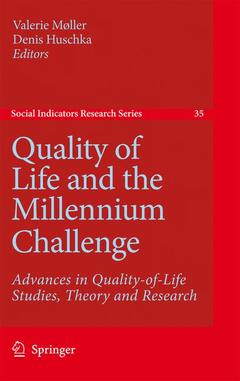Quality of Life and the Millennium Challenge, Softcover reprint of hardcover 1st ed. 2009 Advances in Quality-of-Life Studies, Theory and Research Social Indicators Research Series, Vol. 35
Coordonnateurs : Møller Valerie, Huschka Denis

The new millennium is widely considered to be the age of globalisation, democratisation, and human rights. We live in a knowledge society and in a time of risk and uncertainty. World society is rapidly urbanising and ageing and exhausting its natural resources. It is the interplay of such key trends of the era that calls for a fresh approach to measuring quality of life. This collection of papers presents an innovative approach to evaluating living standards and wellbeing under the new circumstances facing individuals and societies in twenty-first century. Contributions cover a wide range of issues that impact positively and negatively on wellbeing in our age. While stability, trust, equal access to resources and the social integration of disadvantaged members of society enhance well-being, poverty, social exclusion, congestion in cities, HIV/AIDS and global warming pose threats to both modern and traditional lifestyles. Methodological refinements of conventional measurement tools are presented that take into consideration the rich diversity of lifestyles and values among different populations and regions of the world. This book will be essential reading for social scientists and ordinary citizens who are concerned about the future of human well-being on our planet.
Valerie Møller Is Professor of Quality of Life Studies in the Institute for Social and Economic Research at Rhodes University, Grahamstown, South Africa. She has researched a wide range of quality of life issues in South Africa for public information and policy purposes, including housing, poverty and unemployment, development and service delivery, criminal victimisation and intergenerational relations. Together with colleagues she developed the first survey instruments in the 1980s to measure perceptions of personal well-being among South Africans – the study is regularly updated. More recently she successfully lobbied for the inclusion of a quality of life module in Statistics South Africa’s annual household survey which produces the bulk of national social indicators.
Denis Huschka is Managing Director of the German Council for Social and Economic Data, situated in Berlin/Germany. He also conducts scientific studies as a Research Associate of the Institute for Social and Economic Research at Rhodes University, Grahamstown, South Africa and he is Permanent Visiting Fellow of the German Socio-Economic Panel Study (SOEP). He has done empirical research on regional differences in Quality of Life in Germany and Europe, and on Anomia in post-apartheid South Africa. He was involved in establishing or carrying out several survey initiatives (Wohlfahrtssurvey, Germany; General Household Survey 2002, South Africa; Euromodule, Europe). His most recent research interest focuses on the sociological concept of individualisation as applied to given names as social indicators.
Date de parution : 11-2010
Ouvrage de 282 p.
15.5x23.5 cm
Date de parution : 11-2008
Ouvrage de 282 p.
15.5x23.5 cm
Thèmes de Quality of Life and the Millennium Challenge :
Mots-clés :
Millenium; Nation; Quality of Life; Social Indicators; Social development; Social trends



